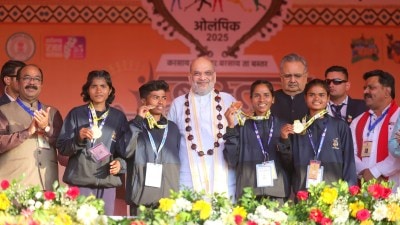It Begins With Us: A romance bloomed in the shadow of the 1992 Bombay riots
While she was plotting her elopement with a man belonging to another faith, communal riots broke out in Mumbai in December 1992, but a foundation laid then led to a three-decade-strong marriage
 Right fit: Idris and Sana Khan
Right fit: Idris and Sana KhanIt was salaam-e-ishq from Muqaddar ka Sikandar (1978) that sealed the deal for Sana Khan, 48. Thirty years ago, as she performed to that song at her college social, she noticed a young man in the front row of the audience at her all-girls’ Sophia College in Mumbai. She had met the student from Maharashtra College of Arts, Science and Commerce only a few days ago, while she was shopping for Diwali with her family. Smitten by her looks, he had handed her a scrap of paper with his phone number written on it. His name was Idris Khan and here he was, gatecrashing her college social.
At the time, Sana Khan was Sapna Singh, a young girl from an upper-caste Thakur family from Uttar Pradesh, based in Mumbai’s Marine Lines. She, too, had been instantly attracted to the handsome young man who had approached her in the shop. That he was a Muslim had no effect on her feelings or subsequent decisions. They met frequently after that but always in a group. “Kids these days get away with a lot. I’d feel nervous if he held my hand in public,” says Sana, with a laugh.
Not that there was much opportunity for that. Only a few days ago, Babri Masjid had been demolished in Ayodhya and the tension was palpable in Mumbai. “The day after the mosque was demolished, I stepped out to call Idris from a booth and witnessed a mob set a Muslim gentleman’s shop on fire near the Marine Lines station. I ran back home through the back alleys, terrified,” she recalls.
But even fear could not deter their mutual attraction. “We were afraid only of our parents. Even though we knew that there would be opposition to our marriage, we felt that the law would still be on our side.
It was quite different then. These new laws (anti-love jihad laws introduced in several states in India) have been brought in because of a lot of misconceptions about Muslims among people,” says Sana.
As expected, both the families were vehemently opposed to the match. Several times, the two tried to end it, only to realise that they could not do without the other. When Sana’s parents fixed her marriage, she knew she had to take matters into her hands. “I did not intend to go through with the wedding, so I made sure my sister liked the trousseau. Knowing my family, I was sure they would convince her for the alliance rather than go back on their word,” she recalls, sounding regretful for a moment before adding cheerfully, “it all worked out.”
While Sana was plotting her elopement, communal riots broke out in Mumbai in December 1992. A little over a month before she walked out of her home for good, there were bomb blasts in her neighbourhood. “We lived in a mixed neighbourhood with lots of Muslim families. My father and brother had lots of Muslim friends. We were aware of the differences but we had never experienced the kind of hatred that is on display these days,” she says.
For almost a year before she left home, she had secretly been trying to observe fasts and pray according to Islamic customs of her own volition. A day before her wedding, she arrived at Idris’s cousin’s place in Kalyan, where the marriage was solemnised. On the day of the wedding, Sapna converted to Islam and became Sana, meaning “praise”.
Their marriage sealed, what lay ahead was the arduous task of convincing their parents to accept their will. Neither family was willing to relent. “My parents hosted our reception over three months after the wedding and told everyone that the nikah happened in a hurry because Sana’s family was poor and could not afford a feast,” reminisces Idris, 56. The birth of their son a year later did nothing to bridge the divide.
It was with the arrival of their daughter four years after their wedding that Sana’s parents finally invited her home. Unsure of what to expect from his in-laws, Idris arranged for enough of “his people” in the vicinity to defend them should the occasion arise. It proved unnecessary — the only thing that awaited them was a tearful reunion.
Over time, Idris’s family came around, too. But Sana says she knew they had finally triumphed when both sides of the family got together to celebrate her son’s wedding last month in Mumbai. “All my aunts and cousins visiting from Varanasi were bowled over by the hospitality they were met with,” she says, with a contented smile. The only people missing were her deceased father and father-in-law. “I really missed them. My father would have been pleased to see his extended family accept my in-laws,” she says, adding, “Opposing love is so futile, why do people try?”
- 01
- 02
- 03
- 04
- 05































